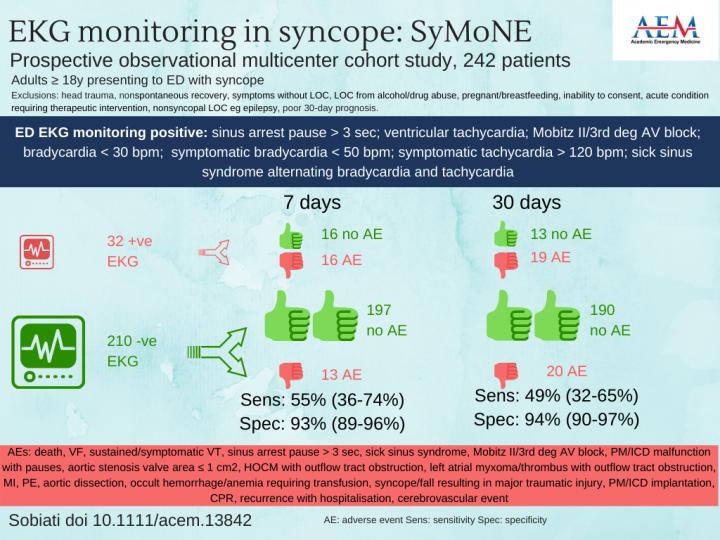
Credit: KIRSTY CHALLEN, B.SC., MBCHB, MRES, PH.D., LANCASHIRE TEACHING HOSPITALS, UNITED KINGDOM
DES PLAINES, IL — Prolonged cardiac rhythm monitoring will improve arrhythmia diagnostic yield among non-low-risk emergency department patients with syncope. That is the finding of a study published in the January 2020 issue of Academic Emergency Medicine (AEM), a journal of the Society for Academic Emergency Medicine (SAEM).
The lead author of the study is Monica Solbiati MD, PhD, Department of Clinical and Community Sciences, University of Milan, Milan, Italy.
The multicenter study by Dr. Solbiati et al. found that while the overall diagnostic accuracy of emergency department electrocardiographic monitoring of non-low-risk patients syncope is imperfect, the sensitivity of prolonged telemetry (>12 hours) is high. Although the optimal duration of ECG monitoring has not been defined, the results support the use of a minimum of 12-hour monitoring as a safe alternative to hospitalization for the management of non-low-risk patients with syncope.
The study is the first designed specifically to assess the diagnostic accuracy of ECG monitoring in non-low-risk patients with syncope; the findings confirm the crucial role of telemetry in the ED management of patients with syncope. Further studies are needed to verify the safety and effectiveness of this strategy in terms of reducing unnecessary hospitalization and costs.
Venkatesh Thiruganasambandamoorthy, CCFP-EM, MSc, associate professor in the Departments of Emergency Medicine and Epidemiology at the University of Ottawa as well a Scientist at the Ottawa Hospital Research Institute commented:
“This study provides additional evidence that prolonged cardiac rhythm monitoring will improve arrhythmia diagnostic yield among non-low-risk emergency department patients with syncope.”
Dr. Thiruganasambandamoorthy is internationally recognized for his research on emergency department syncope. He is recipient of several peer reviewed grants, won several excellence awards, and is co-author of several guidelines, consensus/position statements nationally and internationally.
###
ABOUT ACADEMIC EMERGENCY MEDICINE
Academic Emergency Medicine, the monthly journal of Society for Academic Emergency Medicine, features the best in peer-reviewed, cutting-edge original research relevant to the practice and investigation of emergency care. The above study is published open access and can be downloaded by following the DOI link: 10.1111/acem.13842. Journalists wishing to interview the authors may contact Stacey Roseen at [email protected].
ABOUT THE SOCIETY FOR ACADEMIC EMERGENCY MEDICINE
SAEM is a 501(c)(3) not-for-profit organization dedicated to the improvement of care of the acutely ill and injured patient by leading the advancement of academic emergency medicine through education and research, advocacy, and professional development. To learn more, visit saem.org.
Media Contact
Stacey Roseen
@SAEMonline
708-606-7120
Related Journal Article
http://dx.




